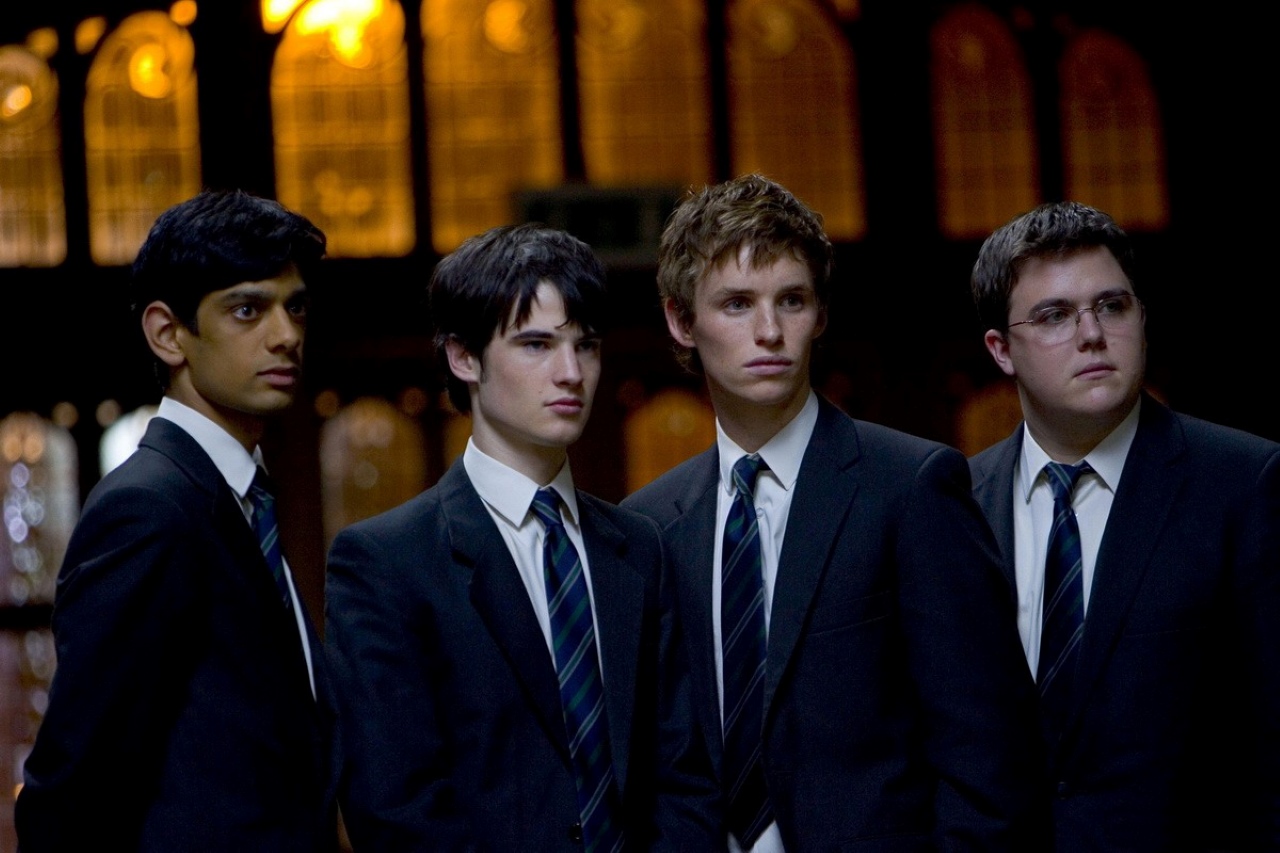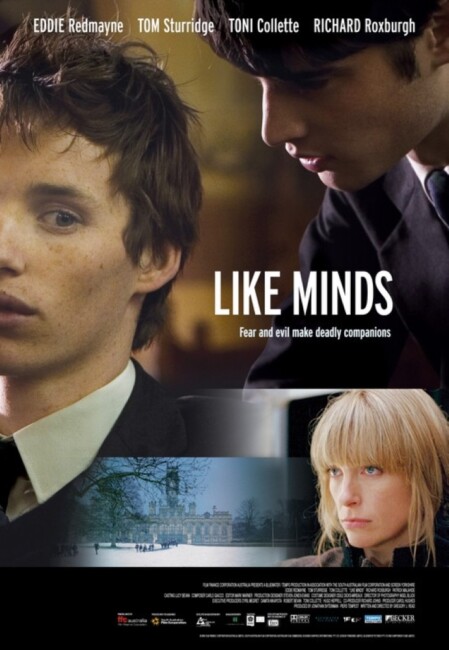Crew
Director/Screenplay – Gregory J. Read, Producers – Carol Hughes, Jonathan Shteinman & Piers Tempest, Photography – Nigel Bluck, Music – Carlo Giacco, Digital Visual Effects – Fuel International (Supervisor – Dave Mosley), Special Effects Supervisors – Jon Blaikie & Ian Rowley, Production Design – Steven Jones-Evans. Production Company – Film Finance Corporation Australia/South Australian Film Commission/Screen Yorkshire.
Cast
Eddie Redmayne (Alex Forbes), Toni Collette (Sally Rowe), Tom Sturridge (Nigel Colbie), Richard Roxburgh (Inspector Martin McKenzie), Patrick Malahide (Headmaster Forbes), Jonathan Overton (Josh Campbell), Kate Maberly (Susan Mueller), Amit Shah (Raj), David Threlfall (John Colbie), Cathryn Bradshaw (Helen Colbie), Hugh Sachs (Reverend Donaldson)
Plot
Forensic psychologist Sally Rowe is called in by police to help with seventeen year-old Alex Forbes who has been arrested and charged with shooting a school friend. Inspector Martin McKenzie is determined to make something stick on Alex, although they have no clear evidence other than his being at the scene. Sally interviews Alex and he tells his story. He was a pupil at a boys’ boarding school where his father was also the headmaster. He resented the fact that he was forced to share a room with Nigel and was disturbed by Nigel’s hobby of taxidermy, which included eviscerating and stuffing animals in the room. He and friend Josh Campbell decided to teach Nigel a lesson by abducting and taking him aboard a train and then dangling him out the window but this ended with Josh accidentally falling out to his death. Afterwards, Nigel began to play creepy games with Alex, leaving animal body parts and then a severed human hand in his room. He insisted that the two of them were part of a Knights Templar bloodline and inheritors of a destiny that made them so close that he could read Alex’s mind and anticipate all his moves. Nigel’s games became even more disturbed when he killed and eviscerated a girl that Alex liked.
This British/Australian film is an interesting variant on the boys’ boarding school psycho-thriller – see the likes of Unman, Wittering and Zigo (1971), Child’s Play (1972) and Absolution (1981). Like Minds was the feature film debut of Australian director Gregory J. Read who had previously made a handful of documentaries.
The plot has a conceptually wild swim of elements that leaves one constantly wondering where on Earth everything is going. It heads into some genuinely strange territory with Tom Sturridge moving into Eddie Redmayne’s room and then conducting taxidermic experiments in the room; Eddie and his friend abducting him aboard the train to teach him a lesson; and especially the scenes where Tom Sturridge takes Eddie Redmayne to a hidden room in the cellar of his family home in the dead of night and starts making claims about Knights Templar history that connect them as soulmates.
Like Minds gets even stranger when Eddie Radmayne starts believing that Tom Sturridge can read his thoughts and then some of Sturridge’s bizarre psychological games, including leaving severed hands on Eddie’s bed. And then comes the genuine shock moment where we see the body of Kate Maberly eviscerated in a greenhouse, just like one of Tom Sturridge’s taxidermy animals, with her stomach surgically pinned open and pieces of intestine draped from the greenery. There is a perverse scene where Tom Sturridge subsequently breaks into a morgue in the middle of the night and expects Eddie Redmayne to have sex with Kate Maberly’s corpse.

On the other hand, despite constantly hinting at an extravagant plot – mind-reading, murderous teenagers playing psychological games, Knights Templar bloodlines and conspiracies – this is far more mundane in the eventual unfolding. The way Gregory Read sets the plot up, you keep expecting that Like Minds will turn into some kind of historical conspiracy a la the same year’s The Da Vinci Code (2006) or something even more fantastical. However, the plot never seems to grapple with the ideas it introduces.
Other parts seems conveniently juggled about according to the requirements of the moment – one of the more annoying aspects is how when Eddie Redmayne is first introduced, Read tries to emphasise his coldness and arrogance to make it seem like he is the killer and yet when the bulk the film unfolds, his character comes across as far more vulnerable and haunted. It is the case of a character being bent out of shape in order to provide a red herring and make us think that Toni Collette is dealing with a cold-blooded teenage killer. Similarly so, the plot is twisted in a way that makes it seem like it was Tom Sturridge who was killed on the train in order to produce an at least effective shock twist when the person killed turns out not to be Sturridge after all. Also the ending muddies things and leaves us unsure who killed Susan and especially who desecrated her grave.
If nothing else, with its wild plot elements and constantly lurking sense of the dark and perverse, Like Minds is never an uninteresting film. Although one of the complaints that one might make about Gregory Read is that he makes a static film that comes mostly relayed through characters talking and never holds much in the way of dramatic action. One good scene where things do come alive is where Toni Collette finds her way down to the cellar hideaway and starts uncovering secrets, only to be attacked by a vicious dog. In terms of tone and plotting though, it was hard to stop reminding oneself that Like Minds was actually a theatrical release rather than a British tv crime drama. Although to this extent you do have to commend Gregory Read for the high degree of credibility he evinces in terms of setting – despite it being set in a quintessential British boys’ boarding school, most of the film was actually shot in various parts of Australia.
Even though the psychological profiler has become a standard one over the last few years, Toni Collette impresses with the cool professionalism of her performance and most of all in the chameleon shift she makes fromthe other roles we have seen her in. The two boys – Eddie Redmayne, some years before he became a rising star, and Tom Sturridge, the son of Charles Sturridge, the director of Brideshead Revisited (1981) and FairyTale: A True Story (1997), both give strong and intelligent performances of considerably shaded nuance.


